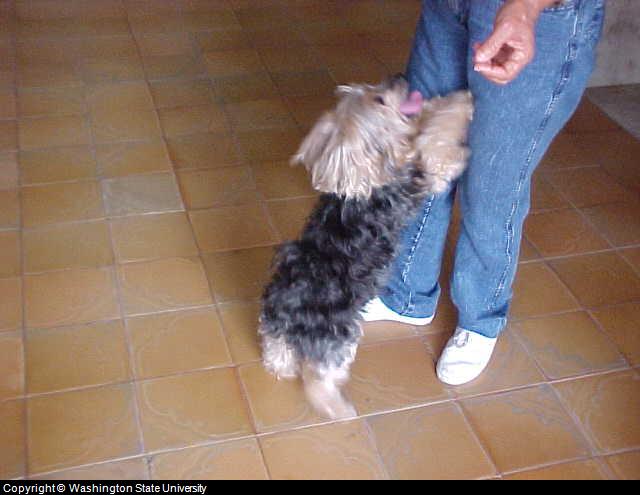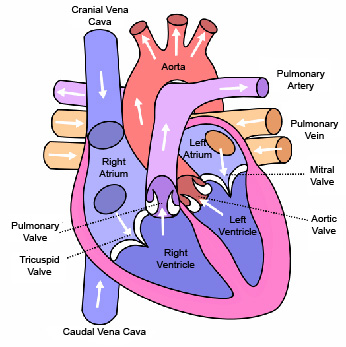Heart and Blood:
Heart and Blood QuickLinks
Causes of Congestive Heart Failure in Dogs:
Caning congestive heart failure is not a specific disease, but
it is
representative of some type of serious underlying cause. Dog heart
conditions such as heart murmurs, certain abnormailities and
arrhythmias are considered a dog heart disease until these problems
cause the heart to fail, which can occur when they become more severe.
Heart disease may not require treatment, although heart
failure
requires treatment 100% of the time.
Though the
mechanism of
this particular condition suggests that, “It is the inability of the
heart to
pump blood in adequate volume and pressure.” but, it should be noted
that a dog heart inadequacy may occur for various reasons. These may
be;
- Congenital/Genetic defects
- Cardiomyopathy or Heart muscle disease
- Dog heart worm disease
- Degeneration of Heart valves
- Pericardial defects
- Arrhythmia or Irregularity of heart rhythms
The aforementioned list are some of the possible causes of canine
congestive heart failure, which reduces heart strength. The heart
progressively loses its ability to pump blood.
But, it has been noted that all the
possible causes of congestive heart failure in dogs commonly affect two
dog heart mechanisms,
which are Degenerative valvular disease (DVD) and Dilated
cardiomyopathy (DCM).

Intact female sent to investigation because bradycardia was detected in routine veterinary consultation.
Except for bradycardia (slow heart beat -51beats/min),
no other signs were detected
Degenerative valvular disease is the progressive degeneration in the
ability of the
valves in a dog's heart to prevent the back-flow of blood during
contractions.
It is most commonly noted in the artrial-ventricular valve, which is
also
called the mitral valve. On the other hand, dilated cardiomyopathy is
the
mechanism related to the heart muscles, where the heart chamber,
specifically
the ventricular chamber enlarges in size, due to which the strength
used for pumping
blood steadily reduces.

Dog Heart Anatomy
In either mechanism or condition, the flow and pumping of blood becomes slower over time, leading to the retention of fluids in the vessels, chambers and body tissues. Progressively, a congestive mode gets developed due to which the heart becomes unable to pump blood in adequate pressure and volume.
Symptoms of Congestive Heart Failure in Dogs:
Canine congestive heart failure is not a disease itself, but it represents the presence of a serious underlying cardiac disease. It is usually characterized non specifically meaning that any dog heart disease symptoms could indicate a range of problems, therefore the veterinarian can only suspect a possible cardiovascular problem, including congestive heart failure.
Dog heart disease symptoms include:
- exercise intolerance
- cough
- sleepiness
- reduced appetite
- shortening of breath
- fainting
Note that dog fainting and the accumulation of fluids in the abdomen
may represent possible
cardiovascular congestion, which may lead to fatal heart failure in
the later stages of the condition. Along with these symptoms, dogs may
show some other
symptoms associated with specific diseases as well, which should be
clinically
identified with the help of the respective symptoms and history.

Picture Dog Congestive Heart Failure
Enlarged abdomen in a Bulldog with CHD
(dilated cardiomyopathy);
Diagnosis of Congestive Heart Failure in Dogs:
It's important to identify the clinical manifestations of these cardiovascular signs. A patient with symptoms such as an intolerance to exercise, cough, ascites (accumulation of fluids in the abdomen) and frequent fainting should be suspected for possible canine congestive heart failure.
Clinically, a dogs history of the aforementioned symptoms should also be closely monitored, like any development in symptoms over time, breed information, age and all relevant information. Additionally, it is important that an examination include the auscultation of the heart (listening to heart sounds) and conducting a chest examination to check cardiovascular distribution.
To confirm the diagnosis, blood biochemical profiling is needed to determine any underlying cause, as well as chest radiographs for pulmonary edema and to check the anatomical status of the lungs and heart, Electrocardiogram and Echocardiograms help to evaluate the size of the heart and heart beat strength.
Treatment of Congestive Heart Failure in Dogs:
Canine congestive heart failure is a physical defect of the heart, i.e. the inability to pump due to poor valve anatomy and physiology. This condition is only treated symptomatically which means that there are no specific surgical or medical treatment plans available for this condition. Dog heart disease symptoms are treated, and heart strength maintained with the help of specific medications and supportive components such as natural remedies.
Initially, body fluid levels are addressed, in order to keep them at nearly normal levels. Accumulated body fluids are eliminated with the help of the administration of diuretics. These types of dog heart medications keep the fluid flow at regular levels and work to keep excessive fluids from accumulating in the body through a process called regular excretion. This approach helps to reduce any chance of ascites or fluid accumulation in the tissues, abdomen and lungs, but also keeps the congestive pressure over the heart to a minimum.
Since it is a ventricular valve defect, pressure is usually generated over the heart due to the congestive accumulation of fluids in the vessels. Therapeutics called vasodilators are administered to increase the circumference of the blood vessels to reduce possible pressure on the heart chamber due to congestion in the vessels. Similarly, supportive therapies like the administration of tonics, cough suppressants and a dietary sodium intake restriction (reduced salt) is recommended for dogs with a diagnosis of canine congestive heart failure.
It is very important to maintain the heart strength, vessels and heart valves to keep dog heart symptoms to the lowest point possible and to reduce any chance of congestion. It is therefore always recommended that instructions provided a veterinarian are strictly followed. It is also important to provide supportive heart tonics such as the natural remedy Heart & Circulation Tonic.
Prognosis for Congestive Heart Failure in Dogs:
Though the prognosis or possible outcome of the condition depends upon the severity of dog heart symptoms, underlying cause, age and/or breed of patient, it should be remember that canine congestive heart failure is a progressive condition and valvular degeneration or cardiomyopathy cannot be reversed. That is why, the prognosis for this condition totally depends upon the severity of the condition and the management of symptoms in addition to supportive care and therapies provided. Usually, well managed patients have a “Very Good” prognosis, but those with some serious underlying cause have an “Uncertain” prognosis and are closely guarded.
|
|